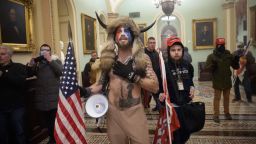On Wednesday at noon, Joe Biden became the 46th president of the United States. He was not arrested beforehand. Nor were any of the other high-profile Democratic politicians who attended the inauguration. Donald Trump didn’t declare martial law. He flew to Florida quietly.
And thus died one of the longest-lasting and most widespread conspiracy theories of last four years – organized loosely under the flag of the group known as QAnon. Adherents to the conspiracy theory, which had become a sort of conspiracy catch-all for people who saw Trump as some sort of savior figure, were left wondering what the heck happened.
So, where does Q go next? Or is it over? I reached out to CNN’s Donie O’Sullivan, who has been covering the movement adeptly for CNN, to answer those questions – and more.
Our conversation, conducted via email and lightly edited for flow, is below.
Cillizza: QAnon’s core belief was that Trump was installed by the military and would conduct a roundup of Democratic politicians engaged in wrongdoing. That, uh, didn’t happen. Do they have an explanation?
O’Sullivan: Wednesday was a rough day for believers of this conspiracy theory. The reaction has been mixed.
Some believers seem to be coming to the realization they have been duped. For some of them, it was confirmation of suspicions they have had for a while. They feel like Trump has betrayed them.
I was at a QAnon event in Arizona back in October and one of the guys who was speaking at it, someone who is a major peddler of the conspiracy theory, was telling the audience to stay patient, that even though the conspiracy theory was three years old at that point and the big round-up of Democratic politicians didn’t happen – it would happen and everything would be fine after Trump’s reelection.
Guys like that, who have social media accounts and sell QAnon merch to cash in on the conspiracy theory, are already coming up with ways to spin the conspiracy theory forward – some are even trying to say Biden is actually a QAnon guy.
Cillizza: How much (or little) was Q impacted by the January 6 riot where its adherents seemed to play a major part? Did it hurt itself?
O’Sullivan: January 6 was the physical manifestation of the online mob.
The guy with the horns on his head who is in all the pictures from the Capitol and has now been arrested was a big QAnon believer. He was at that event in Arizona, too, and I saw him outside Trump’s rally in Dalton, Georgia, two days before the insurrection.

A lot of these guys really thought they could get away with doing this because they so believed in the conspiracy theory and they so believed that they were doing what Trump wanted them to do.
I think seeing them now being rounded up and eventually prosecuted sends a message to QAnon followers that they can’t act with impunity. Though it is also going to create some QAnon martyrs.
Cillizza: Is Trump still championed as a Q hero? Or does the fact that he didn’t make good on the promise they had for him?
O’Sullivan: That remains to be seen. QAnon followers are trying to figure out a narrative right now. In a few weeks’ time if Trump finds a platform that will have him online again and he starts spreading more misinformation and hate – he might find himself again the QAnon darling.
Cillizza: And now the big Q about Q: Is the movement dead? Or will it reorganize around another conspiracy and live another day?
O’Sullivan: This is the most important question.
In our story published today, we spoke to a guy who says he isn’t a QAnon follower, but he does espouse some of its conspiracy theories.
I met him in the early hours of the morning in DC on Wednesday and he was repeating a conspiracy popular among QAnon followers that Trump would stop the inauguration of Biden using martial law.
He also said the election was stolen and that it was left-wing radicals responsible for the violence here on January 6.
I caught up with him after the inauguration when reality was settling in. While he accepted he was wrong about martial law – for him the lies about the stolen election and the left-wing radicals were still the truth.
And so there are possibly millions of Americans who have been indoctrinated in conspiracy theories, and just because Biden is the President, that is not going away.
It might get even worse for some now that the major social media platforms are kicking off a lot of QAnon accounts (at least for now) it is forcing some believers to darker corners of the internet where they will see more wacky theories and might get radicalized further.
One of the great challenges, I think, in 2021 is how America is going to deal with that very issue. We have a domestic radicalization problem with disinformation at its core.


